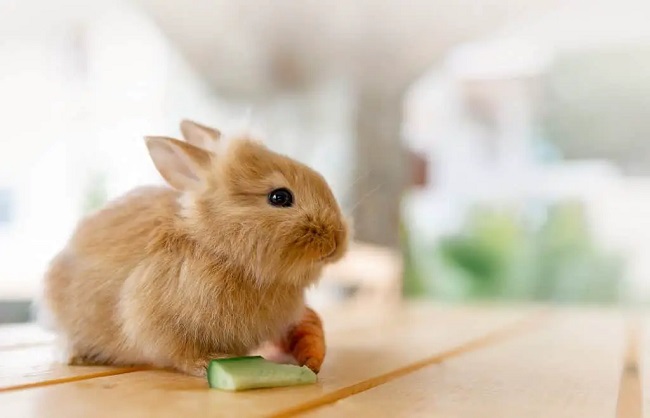As a rabbit owner, it’s crucial to understand what makes a healthy diet for your furry friend. Among the many questions owners ask, “Can Rabbits Eat Cucumbers?” is quite popular. The answer is yes, but with some important caveats to consider.
In this comprehensive guide, we’ll explore the role cucumbers can play in your rabbit’s diet and how to feed cucumbers to your bunny safely.

Understanding Rabbits’ Dietary Needs
To understand where cucumbers fit into a rabbit’s diet, it’s important to first understand their basic dietary needs.
The cornerstone of a rabbit’s diet is hay, which aids their digestion and provides the necessary fiber. Additionally, they also require a variety of fresh vegetables and a small number of fruits as treats.
Can Rabbits Eat Cucumbers?
Yes, rabbits can eat cucumbers. Cucumbers are non-toxic to rabbits and are safe to eat in moderation. They are a hydrating snack due to their high water content (96%), providing a nice way for your rabbit to cool down, especially during hot summer days.
Benefits of Cucumbers for Rabbits
Cucumbers are rich in several nutrients beneficial to rabbits. They contain vitamin K, potassium, and magnesium, which contribute to a rabbit’s overall health.
Additionally, cucumbers’ high water content can aid in hydration, although it should not replace fresh drinking water.
Potential Risks of Feeding Cucumbers to Rabbits
While cucumbers are generally safe for rabbits, their high water content can pose risks if fed in excess. Overfeeding cucumbers may lead to diarrhea, a serious concern in rabbits.
Diarrhea can lead to dehydration and a possible imbalance in the gut flora, which can be harmful to your pet.
How to Feed Cucumbers to Your Rabbit
If you decide to add cucumbers to your rabbit’s diet, it’s important to do so gradually. Start by offering small amounts, allowing your rabbit’s digestive system to adjust. Watch for any signs of discomfort or changes in their droppings.
Remember to wash the cucumber thoroughly to remove any pesticides, or better yet, choose organic. You can feed the whole cucumber, including the skin and seeds, as they are not harmful to rabbits. However, make sure the cucumber is fresh and not pickled, as pickled cucumbers are too high in sodium for rabbits.
Other Safe Vegetables for Rabbits
Apart from cucumbers, there are several other vegetables that can be safely incorporated into your rabbit’s diet.
- Bell Peppers: All colors of bell peppers are safe for rabbits. They are high in vitamin C, a nutrient that rabbits cannot produce on their own. However, make sure to remove the seeds before feeding.
- Carrots: While popular culture often depicts rabbits munching on carrots, they should be given sparingly due to their high sugar content. Carrot tops, however, are an excellent choice and can be fed more freely.
- Leafy Greens: Leafy greens such as romaine lettuce, kale, arugula, and spinach are excellent for rabbits. They are packed with vital nutrients and fiber.
- Broccoli and Cauliflower: Both are safe for rabbits in small amounts. However, some rabbits may experience gas from these vegetables, so it’s essential to monitor your pet.
- Parsley and Coriander: These herbs can be a delightful addition to your rabbit’s diet. They are high in several nutrients, including Vitamin C and Calcium.
It’s important to note that the safe vegetables mentioned above should be introduced gradually into your rabbit’s diet to prevent digestive issues.
It’s also vital to remember that the primary part of a rabbit’s diet should be grass hay, which helps keep their gastrointestinal tract healthy.
Conclusion
While cucumbers can indeed be a part of your rabbit’s diet, they should not replace the vital components of hay, a variety of other vegetables, and a small amount of high-fiber pellets. Like all treats, cucumbers should be given in moderation and introduced gradually to avoid any digestive upset.
In the end, every rabbit is unique, and what works for one may not work for another. Always monitor your rabbit when introducing new foods into their diet and consult with a veterinarian if you have any concerns about your rabbit’s diet or health.
























